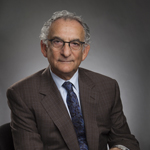Howard Wetston
October 2013 Honorary Degree Recipient

Doctor of Laws (honoris causa)
It was the top business news story of the day: Would Maple Group, a consortium of Canadian financial interests including banks and pension funds, successfully take over the TMX Group, which includes the Toronto Stock Exchange, positioning the TMX to better compete internationally? It was a proposal that would create a vertically integrated exchange, providing trading, clearing, settlement and depository services for a range of financial instruments traded in Canada. Not only was it on the cutting edge of regulatory challenges internationally, it would also transform the regulatory landscape of Canadian capital markets.
Charged with ensuring that Canadian investors, shareholders, corporations and citizens would be well-served by the merger was the Ontario Securities Commission, or OSC, the Honourable Howard I. Wetston, Q.C. at its helm. Over the course of 2011 and 2012, under Mr. Wetston’s leadership, the OSC conducted an extensive review and consultation on Maple Group’s application to acquire TMX Group Inc., before giving the deal its stamp of approval—along with a list of terms and conditions to ensure that public interests were protected.
Mr. Wetston’s resume is impressive: Chair and CEO of the Ontario Securities Commission. Chair and CEO of the Ontario Energy Board. Federal Court of Canada Judge. Commissioner of what is now the Competition Bureau. General Counsel at the Canadian Transport Commission and the Consumers’ Association of Canada. Assistant General Counsel at the National Energy Board. Crown Counsel in Nova Scotia and at the federal Department of Justice.
He was appointed Chair and CEO of the Ontario Securities Commission in 2010. His three-year term was recently extended for another two years to allow him to finish implementing the OSC’s first publicly documented strategic plan since its creation as a self-funded Crown corporation, restructuring the OSC’s operations and senior management team to build a 21st-century regulator.
Before joining the OSC, Mr. Wetston served as Chair and CEO of the Ontario Energy Board, leading the OEB through a period of tremendous political and market flux as the Board transitioned from a public utility model to a hybrid public/private sector model, and streamlining Ontario’s energy regulations. He made the OEB both more accountable and more transparent.
Mr. Wetston’s connections to Nova Scotia run deep. He spent his formative years here, arriving with his parents in Sydney in 1949 as a very young child and growing up there as a student at Sydney Academy. He obtained his law degree from ��ɫֱ�� in 1974 and was called to the Nova Scotia Bar in 1975.
Throughout his career, he has distinguished himself as an economic regulator. To have led the Competition Bureau, Ontario Energy Board and Ontario Securities Commission, interspersed with his tenure as a federal court judge, is probably unprecedented in Canada.
But even more impressive is Mr. Wetston’s track record as a transformational leader. He is committed to innovation, transparency and accountability. This commitment, along with his skill at managing and transforming complex organizations during times of flux and transition, has earned him a reputation as a thought leader. He challenges the organizations he leads to rethink regulation and encourages them to take an innovative and outcomes-based approach. His goal? To achieve clearer expectations for market participants and better accountability and responsibility by the regulator. Through this, he fosters an attitude of service to market participants, stakeholders and the public.
A common refrain among Mr. Wetston’s colleagues is that he questions why things are done the way they are, and then pushes his teams to consider how things can be done more effectively, more fairly, more transparently.
It is in recognition of his most distinguished and varied career as an economic regulator that I ask you, Mr. Chancellor, in the name of Senate, to bestow upon the Honourable Howard I. Wetston, Q.C., the degree of Doctor of Laws, honoris causa.
